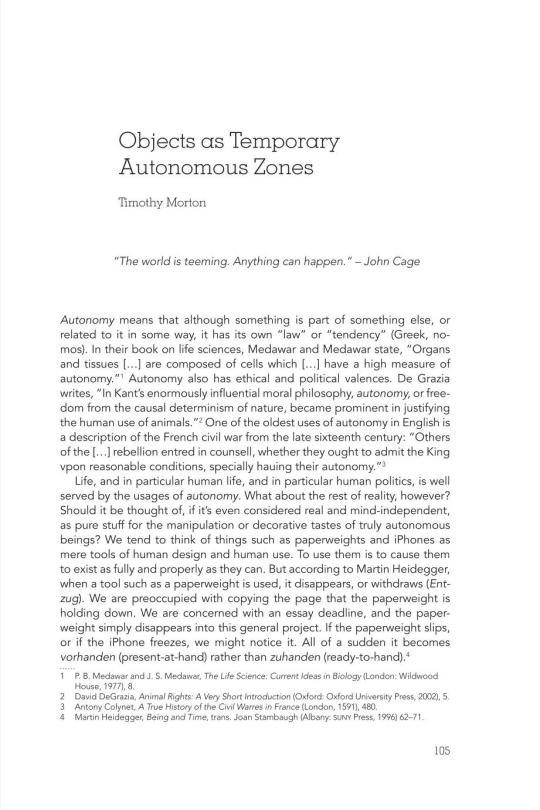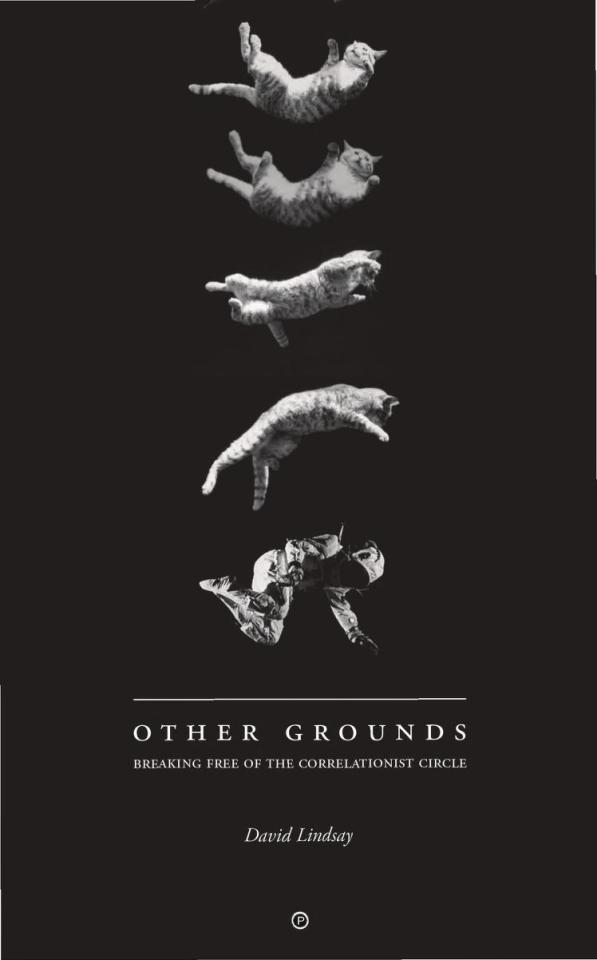#Object-Oriented Ontology
Explore tagged Tumblr posts
Text
Author: Chapter 3, Filing Systems
AUTHOR: A Serial Saturday NovelChapter 3 | Week 3 of 52 | June 16, 2025 Filing Systems Organization is not neutral. Every filing system embodies a philosophy about what deserves preservation, what merits accessibility, what can be safely forgotten in the lower drawers where ambitious researchers never venture.I am Cabinet Unit 247-C, third drawer from the top, rightmost cabinet bank in the…
#author#bureaucratic fiction#collaborative authorship#Experimental Fiction#filing cabinet narrator#institutional critique#intellectual property#Object-Oriented Ontology#Portland fiction#Serial Novel#Serial Saturday#Speculative fiction
1 note
·
View note
Text
This is a driving motivation for contemporary philosophical movements like new materialism, speculative materialism and object-oriented ontology that give priority to objects and often wind up with (sometimes inexhaustibly) rich pictures of the world. Here are some open-access books if that sounds interesting.
Tool-being: Elements in a theory of objects
The Democracy of Objects
Realist Magic: Objects, Ontology, Causality
The Interfact: On Structure and Compatibility in Object-Oriented Ontology
Less theoretically (and not open-access) there's a wonderful series from Bloomsbury called Object Lessons of short, deep-dive books with titles like Glitter, Eye Chart and Cell Tower. And for human interaction with objects specifically, I was personally charmed by the collection Evocative Objects: Things We Think With.
I guess I just feel like nobody appreciates physical things enough. Like, there's your concept people, right, your concept lovers who think about everything as a concept. Like what if everything was Geist from Hegel, or what if everything Bayes Theorem from math book, and so on. Your concept lover. And then you've got your drama lovers where everything is drama. Like everything is, you know, individuals, characters. There's this guy and that guy and what do they think, how do they feel about each other? And this guy said to that guy blah blah and then he said to the other guy blah blah blah and was that fair? Was it right? Or should he have told the first guy first that's drama, that's monkey business, you know, chimps, they love that shit, good thing we don't usually tear each others limbs off like the chimps do.
Well so I think concepts are important, and I think interpersonal relationships are important. I mean I'm a human, I'm a chimp with a math brain, I'm a zoon politikon. I think about concepts and relationships all the time. Two of the most important types of thing to me for sure!
But I do feel like the culture at large has insufficient appreciation for objects. You know, things, specific things, that you can hold, feel, do this and that with. Objects. It's like crass or something to be into objects as such. But objects are great! I spend so much of my life dealing with objects, you know, and I like it. I'm happier when I'm dealing with a good object and less happy when I'm dealing with a bad one. I like natural objects and man-made objects, all kinds of objects, and I think objects are important. Too many have forgotten the joys and virtues of objects. You know, internet lives are not lacking in concepts nor in drama, but they are lacking in objects. I think this is what touch grass is about. I think it's desirable to spend time physically interacting with the world, you know, everyone should spend more time doing objects.
139 notes
·
View notes
Text

#silly stuff#spider man#object oriented ontology#animist horror#chuck tingle writes “Spider-Man”#comic excerpt
570 notes
·
View notes
Text
My theory readings today used the term “thingification” so yall know who I thought of immediately
#trafficblr#hermitblr#does anyone understand object oriented ontology#can you explain it to me pls#tangotek
40 notes
·
View notes
Text
"The history of [B]lackness is testament to the fact that objects can and do resist."
-Fred Moten, "Resistance of the Object: Aunt Hester's Scream"
12 notes
·
View notes
Text
favorite phenomenon is the existence of all the cute wizard city fanart entitled “this special looks so cute!! cant wait for it to come out!!” and “drew this while waiting for the last distant lands to air!! it looks really good!” and after it actually aired? radio silence.
#LEASSSST favorite phenomenon is three pretty paintings labeled ‘drew a painting for my . ahem. 3 favorite distant lands episodes!’#like girl#drawing IS hard but I’m floundering out here. I cannot be the only one who enjoys all four episodes#to a. healthy. degree👉👈#they go together. it’s a SET. wizards city goes with it. I’m shaking the academic writer who wrote Making A New Meaning For Man —#—object oriented ontology in distant lands --#by the Collar of their Shirt.#and I’m Going to Write a Comeback Paper. ‘objects as a way of Being is a common theme in all four episodes. and also pep is there.’#ITS A THEME THERE TOO YOU WRRENT WATCHING GOES. CRAZY#if you are going to wrangle this theme out of all four episodes then you need to go all out and watch wc more than once#at least they were nice to it. ‘it is a happy episode. he ends up peaceful’ THANK YOU. but this has nothing to do with ur thesis. I love u#sorry fuvk I went off. I just remembered this academic paper I read. about distant lands#not art#having a moment. also queue is dead
15 notes
·
View notes
Text

Continent. Year 1: A Selection of Issues 1.1–1.4 : Jamie Allen : Free Download, Borrow, and Streaming : Internet Archive
12 notes
·
View notes
Text
She orient on my object til I ontology
5 notes
·
View notes
Text
Understanding Object-Oriented Programming and OOPs Concepts in Java
Object-oriented programming (OOP) is a paradigm that has revolutionized software development by organizing code around the concept of objects. Java, a widely used programming language, embraces the principles of OOP to provide a robust and flexible platform for developing scalable and maintainable applications. In this article, we will delve into the fundamental concepts of Object-Oriented Programming and explore how they are implemented in Java.

Object-Oriented Programming:
At its core, Object-Oriented Programming is centered on the idea of encapsulating data and behavior into objects. An object is a self-contained unit that represents a real-world entity, combining data and the operations that can be performed on that data. This approach enhances code modularity, and reusability, and makes it easier to understand and maintain.
Four Pillars of Object-Oriented Programming:
Encapsulation: Encapsulation involves bundling data (attributes) and methods (functions) that operate on the data within a single unit, i.e., an object. This encapsulation shields the internal implementation details from the outside world, promoting information hiding and reducing complexity.
Abstraction: Abstraction is the process of simplifying complex systems by modeling classes based on essential properties. In Java, abstraction is achieved through abstract classes and interfaces. Abstract classes define common characteristics for a group of related classes, while interfaces declare a set of methods that must be implemented by the classes that implement the interface.
Inheritance: Inheritance is a mechanism that allows a new class (subclass or derived class) to inherit properties and behaviors of an existing class (superclass or base class). This promotes code reuse and establishes a hierarchy, facilitating the creation of specialized classes while maintaining a common base.
Polymorphism: Polymorphism allows objects of different types to be treated as objects of a common type. This is achieved through method overloading and method overriding. Method overloading involves defining multiple methods with the same name but different parameters within a class, while method overriding allows a subclass to provide a specific implementation of a method that is already defined in its superclass.
Java Implementation of OOP Concepts:
Classes and Objects: In Java, a class is a blueprint for creating objects. It defines the attributes and methods that the objects of the class will have. Objects are instances of classes, and each object has its own set of attributes and methods. Classes in Java encapsulate data and behavior, fostering the principles of encapsulation and abstraction.
Abstraction in Java: Abstraction in Java is achieved through abstract classes and interfaces. Abstract classes can have abstract methods (methods without a body) that must be implemented by their subclasses. Interfaces declare a set of methods that must be implemented by any class that implements the interface, promoting a higher level of abstraction.
Inheritance in Java: Java supports single and multiple inheritances through classes and interfaces. Subclasses in Java can inherit attributes and methods from a superclass using the extends keyword for classes and the implements keyword for interfaces. Inheritance enhances code reuse and allows the creation of specialized classes while maintaining a common base.
Polymorphism in Java: Polymorphism in Java is manifested through method overloading and overriding. Method overloading allows a class to define multiple methods with the same name but different parameters. Method overriding occurs when a subclass provides a specific implementation for a method that is already defined in its superclass. This enables the use of a common interface for different types of objects.
Final Thoughts:
Object-oriented programming and its concepts form the foundation of modern software development. Java, with its robust support for OOP, empowers developers to create scalable, modular, and maintainable applications. Understanding the principles of encapsulation, abstraction, inheritance, and polymorphism is crucial for harnessing the full potential of OOPs concepts in Java. As you continue your journey in software development, a solid grasp of these concepts will be invaluable in designing efficient and effective solutions.
#javascript#javaprogramming#java online training#oops concepts in java#object oriented programming#education#technology#study blog#software#it#object oriented ontology#java course
3 notes
·
View notes
Text
Life Is Memory Forward
David Hofstadter, in I Am a Strange Loop, asks whether a mosquito uses signs. The question struck me as absurd—not because it’s silly, but because it misunderstands something fundamental. Mosquitoes don’t need signs; they have object orientation. They are oriented toward a world built into them by nature. In a way, they are memory in motion. Life doesn’t need to “recall” in the way a human does…
#animal consciousness#big bang#DNA#existence#experimental essay#forward memory#Hofstadter#object orientation#Object-Oriented Ontology#strange loops#the big bang#time
0 notes
Text
certainly, what had saved me until that moment from the sentimentalized life from which I'd been living, is that the inhuman part is the best part of us, it's the thing, the thing-part of us. That's the only reason that, as a false person, I had never before burrowed beneath the sentimental and utilitarian construction: my human feelings were utilitarian, but I hadn't burrowed under because the thing part, matter of the God, was too powerful and was waiting to reclaim me. The great neutral punishment of general life is that it can suddenly undermine a single life; if it isn't given its own power, then it bursts as a dam bursts -- and arrives pure, unadulterated: purely neutral. That was the great danger: when that neutral part of things doesn't sate a personal life, life arrives purely neutral...Life was taking revenge on me, and its revenge was no more than coming back, nothing more. In every case of madness something came back. The possessed are not possessed by what is coming but by what is coming back. Sometimes life comes back. If everything broke in me as the force passed through, that's not because its function is to break: it just finally needed to come through since it had already become too copious to be contained or diverted -- along its way it buried everything. And afterward, as after a flood, floating upon the waters was a wardrobe, a person, a stray window, three suitcases. And that seemed like hell to me, the destruction of layers and layers of human archeology. --Clarice Lispector, The Passion According to G.H., pg. 65-66
7 notes
·
View notes
Text
Second part: “The world,” he says, “does not exist.”
#ian Bogost#object oriented ontology#interspecies smalltalk#costa rica#fabric art#rhode island#Caroliner rainbow
3 notes
·
View notes
Note
Do you have any idea about "speculative realism" or that "object oriented onthology" thing - I was too young to be present when that was supposedly popular on the blogosphere or whatever so I still am not sure how big it was and how much it is a niche community just writting a wikipedia article about themselves. The only really big name is Nick Land, but if I know my "lore" , he was big way before. Otherwise there is that Cyclonopedia book, but it's author seems to have rejected his previous ideology. Anyways, I know this is a random question and probably irrelevant, but I dunno, guess its sad to feel out of the loop (a more funny example is "the summer of chillwave" which also supposedly was super big in music but somehow nobody talks about it, while everyone remembers way older trends with both more nostalgia, critcism, and documentation) Would also say that I think it had some other links with NRX, but the modern Thielbux meta seems to not jive with it, when he is obssessed with that Girard guy and LoTr stuff lol
It was big on the internet and made a brief splash in academe circa 2008-2010—I remember a friend in grad school trying to collate it with literary realism, trying to do a speculative-realist reading of Sister Carrie or a Jack London novel or something—but in that context in had no NRx-ish connotation, was rather part of a broader suite of "realist" anti-humanisms representing a new generation's exhaustion with the linguistic turn, the idea being to discuss the thing-it-itself as itself after all and not as linguistically constituted or socially constructed, except that the critical intent was still to decenter the oppressive subject. There was "thing theory," "affect theory," the "vibrant matter" new materialist feminism, etc., leading up to the anthropocene discourse that came later. I never got too into any of this, I hate reading theory, though I did end up doing something with affect theory in the least persuasive section of my dissertation. But I was sufficiently impressed with Harman's manifesto for "object-oriented literary criticism" (apparently just an old-fashioned formalism) to quote it twice on here 12 years ago! The summer of chillwave totally passed me by since that was the summer I had to read all the books for my oral exams. Trying to plow through The Death of the Heart and The Dialectic of Enlightenment in a few days and at the same time was not chill at all. I barely listened to any pop music in the late 2000s and early 2010s. I remember "Paper Planes" and then nothing until I was finished with grad school, when Lorde and Lana woke me from my dogmatic slumber. Anyway, yes, Girard vs. Land is the high-theory corollary of the split between the Christian populists and the tech right; Land's "realist" autonomy of capital formalized as technology is exactly what Girard's method wishes to unmask as vectors of immanent desire that ought to be pointed toward God instead. (It's funny that the two leading right-wing ideologies at the moment are just different forms of Marxism: Land the progressive eschatological futurist variant, the Marx of the opening of the Manifesto or Russia in the first years of the revolution; Girard the critical variant devoted to the debunking of ideologies, the redescription of cultural fetish objects as occluded forms of social relation, from the Marx of the critique of commodities to the Frankfurt School... But, as I said, I hate theory, and am in over my head here.)
1 note
·
View note
Text
“Ask yourself: what does your toaster want? How about your dog? Or the bacteria in your gut? What about the pixels on the screen you’re reading off now—how is their day going? In other words, do things, animals, and other non-human entities experience their existence in a way that lies outside our own species-centric definition of consciousness? It’s precisely this questions that the nascent philosophical movement known as Object-Oriented Ontology (arising from ὄντος, the Greek word for “being,” and known to the cool kids as OOO) is attempting to answer or at least seriously pose, and they’re setting certain segments of the art world on fire.”
#art#artist#sculpture#ประติมากรรม#ศิลปิน#ศิลปะ#Object Oriented Ontology#ooo#conceptual art#ideas#creative#object#contemporary art
0 notes
Text

Is it possible to get outside your assumptions and know the world for what it is? As the 20th century came to a close, the verdict seemed to be a resounding “no,” but in recent years a renaissance in speculative thought has sparked new lines of inquiry into de-centering the human. Other Grounds enters this conversation with a decidedly lively voice and an ambitious project to match. Not only can we believe in a reality uncolored by our imaginations, says Lindsay, we can also experience it.
Other Grounds: Breaking Free of the Correlationist Circle : David Lindsay : Free Download, Borrow, and Streaming : Internet Archive
2 notes
·
View notes
Text
thinking about things and stuff (literally)
am currently typing half asleep and thinking about the desolation of things; not just material things, but intangible objects like defunct ideologies or etiolated ideals, or the alien fossils of dead civilisations and their practices. objects in a see and perceive their contexts. objects enter into relations with one another just as we enter into relations with objects; objects are affected and affect just as much as subjects do. and so objects have a kind of deep, taciturn knowledge that they keep hidden behind their wordless bare being. a hidden knowing, slightly melancholic.
i own a starbucks tumbler that was bought the year i was born. the thing that struck me about it was its innocence. it does not know about the 2008 financial crisis. it has, as it seems to me, a perpetual air of naivety and hope about it. because of its objective stasis (it is not alive or subjectively conscious), it is a perpetual material precipitate of its zeitgeist. it knows things, it sees things, it holds things, it holds time, within itself, like a fly in amber, or like a rarefied essence.
or think of the virtual decrepitude of an old 2000s game; for me, it’s virtual families 2, a sims ripoff with 2000s graphics and a suburban american home which is mysteriously ruined and you have to renovate it to unlock new spaces for generations of your virtual family to live in. one day i lost interest in the game and abandoned it, never to open the app again. i wonder what that space is like now, those immaterial rooms, with their dark wooden floors and the lazily drifting specks of white pixel dust. the old yellowing sofa, and the stained blue and pink beds for the children. all these things, these places; i wonder what they know, what they see, what spirit they hold inside of them. (something something phenomenology of space—i havent read that book yet, sorry)
i don’t think we (i) give enough credit to the idea of objective interactions outside of the subject, for the almost mystical interest it offers. the mysticism of the thing in itself, infinitely other to our experience, with its knowledge withdrawn from us. the ultimate esoteric knowledge. or what about things interacting with other things, with no supervention from the subject? like a fire burning cotton, or a storm felling a tree. objects themselves are inaccessible to each other in themselves. everything is only ever in brief contact with everything else in a specific, limited way. and so the world is shrouded in deep mystery, endarkened, nubilated. the mystique of a pre-enlightenment world returns, with its strangeness and sublime vastness.
#graham harman got me kinda good….. he got me thinkjng about things and shit…. damn#its uncanny i find objects uncanny the more i think about them because like what are you hiding from me what do you know…#object oriented ontology question mark?
1 note
·
View note